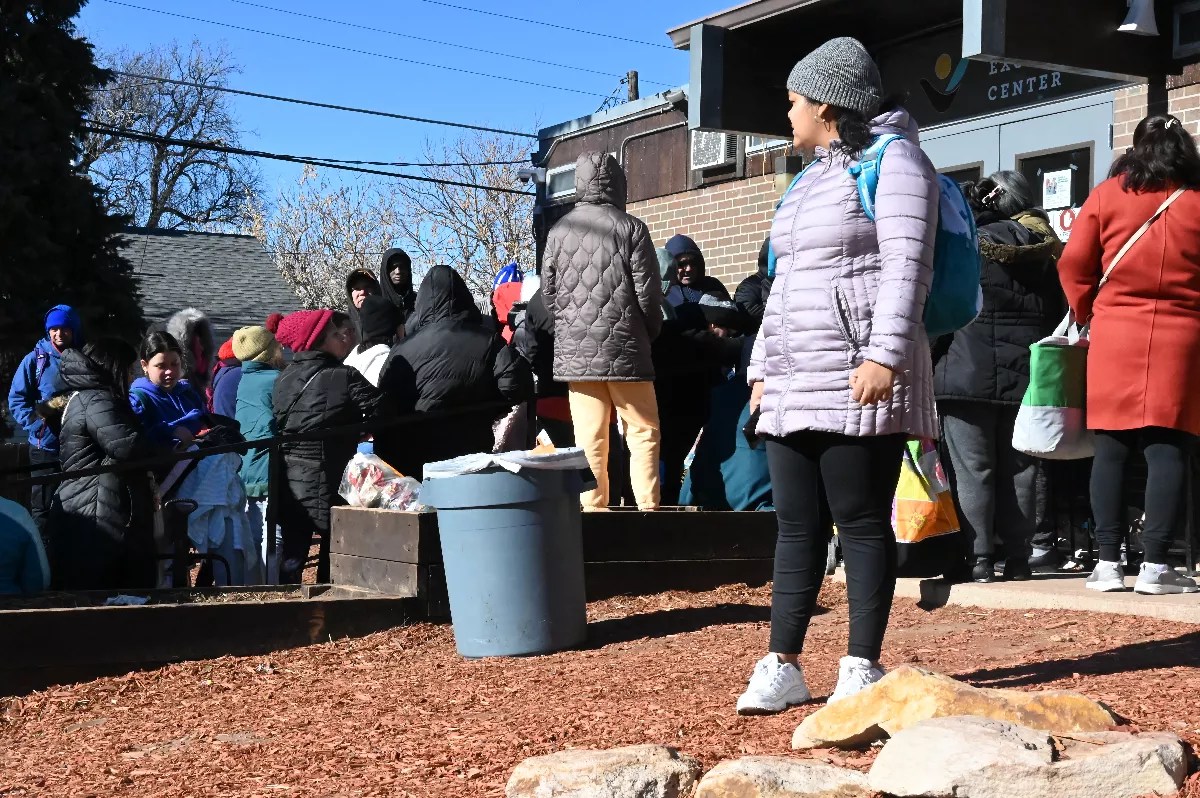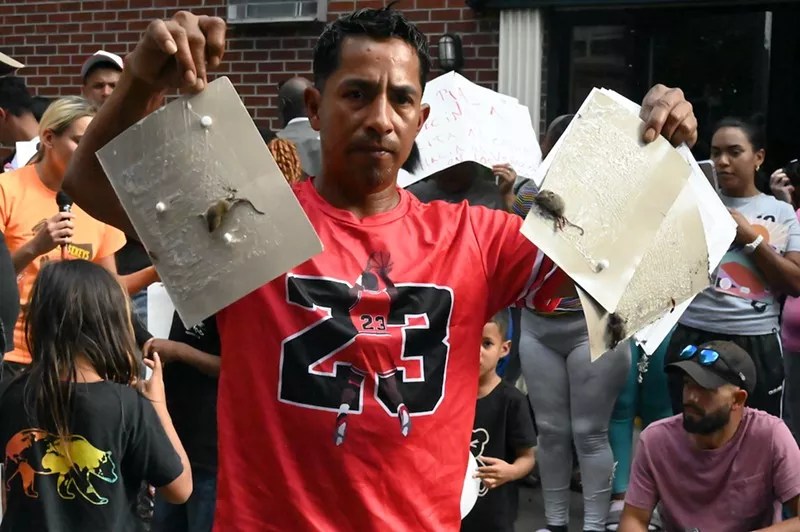
Bennito L. Kelty

Audio By Carbonatix
Two nonprofits caught in the crossfire of a public spat between Aurora Mayor Mike Coffman and Denver Mayor Mike Johnston insist that they did not force migrants to move to Aurora, nor are they responsible for that city’s gang controversy, which the two mayors have been trading blame over.
Papagayo and ViVe Wellness have been the principal nonprofits tasked with helping Denver respond to the influx of nearly 43,000 migrants, mostly from Venezuela, who have arrived in the city over the past two-plus years. However, Yoli Casas, the founder and executive director of ViVe Wellness, and Marielena Suarez, the CEO of Papagayo, both say they’re tired of being reeled into Aurora’s Venezuelan gang controversy.
“It’s kind of getting annoying,” Suarez says. “What has been happening is a lack of information. There are accusations that we’re sending people [to Aurora], but let’s clear this up, because it’s getting old.”
In August, footage of six armed men walking through the halls of the Edge of Lowry apartment complex, at 1218 Dallas Street in Aurora, went viral. The video showed them bearing rifles and handguns while entering an apartment unit. Aurora Police later explained that the men had been searching for a man that they ended up murdering outside the property that night.
The Aurora Police Department hasn’t confirmed that the men were tied to any gang, but the video brought the national spotlight to Aurora as parachute reporters and social media accounts claimed that Colorado’s third-largest city was being taken over by Tren de Aragua (TdA), a multi-national prison gang from Venezuela.
Public attention on Aurora apartment complexes began last August, after CBZ Management, the New York-based owners of the Edge of Lowry, claimed that TdA had forced its employees out of another multi-unit property at 1568 Nome Street; the City of Aurora eventually shut down the complex because of unrelated code violations dating back to 2020.
A third-party receiver who now runs the Edge of Lowry says he successfully cleared the apartment buildings of residents in December, but not before alleged gang members tried to collect rent, BusinessDen reports.
Migrants at both properties have told Westword and other media that they secured leases for their apartments with the help of Papagayo and ViVe Wellness, but Mayor Coffman says he’s unsure how many migrants the nonprofits placed in Aurora. In October, the Aurora City Council passed a resolution, with Coffman’s support, directing its city manager to investigate which nonprofits placed migrants in Aurora and how the organizations secured funding.
On Sunday, January 5, Coffman published an op-ed in the Denver Gazette blaming Johnston and his work with the two nonprofits for “a national embarrassment” that harmed the city’s image and could have “lasting economic consequences.”
Johnston responded to Coffman’s comments on Monday, saying, “I reject that narrative.”
“We run the City of Denver, and he runs Aurora,” Johnston told reporters. “They control the outcomes in their city, and we control what happens in ours.”
Coffman’s op-ed mentioned an article titled “Chaos in Aurora” from City Journal, a New York-based magazine published by the Manhattan Institute, a conservative think tank. The article, published last September, names ViVe Wellness and Papagayo as “two local NGOs,” or non-government organizations, that “signed multi-million dollar contracts” with Denver to resettle more than 8,000 migrants.
The two nonprofits began housing migrants in January 2023 with the help of a $1.1 million contract for both organizations delivered by the Office of New Americans, a state agency in the Colorado Department of Labor and Employment, which reimbursed them until June 2023, Casas says. They then received separate contracts from September 2023 to June 2024, with $1.3 million going to ViVe Wellness and $1 million to Papagayo.
The contracts reimbursed the nonprofits for case navigation, working to find migrants housing and putting children in school, according to Casas. But while the state contracts directed Papagayo and ViVe Wellness to help migrants secure units, it didn’t specify where to place them, Suarez says.
“The contracts state we need to provide deposits and the rent and be the bridge between the client and apartment complex,” Suarez says. “We had to explain who we are, this is the program that they’re under, they might not have their IDs but have immigration papers with their information. We needed to say this is the reason. We needed to be in the middle.”
The City of Denver signed similar contracts in August to reimburse the two organizations, but specifically for housing services. ViVe Wellness has a one-year, $7.9 million contract that reimburses the nonprofit for finding housing and offering rental and utility assistance to most of the roughly 900 migrants going through the Denver Asylum Seekers Program (DASP). Papagayo has a comparable one-year, $3 million contract with the City of Denver that reimburses for housing the rest in DASP.
Casas says the organizations haven’t used all the money set aside in these contracts yet, with more than $5 million left for ViVe Wellness. She estimates that both ViVe Wellness and Papagayo have housed about 8,800 migrant families during the past two years, with about two to four people in each family. The Denver mayor’s office says that more than 20,000 migrants are still somewhere in the metro area.
In his op-ed, Coffman said he confronted Johnston about claims in the City Journal article that the two nonprofits were putting migrants in Aurora and that Johnston refused to share information.
“After reading the article, I confronted Johnston about whether this was true,” Coffman wrote. “He affirmed that Denver had contracts with nonprofits that ‘have’ placed migrants from Denver to Aurora, but he refused to confirm a number, where they were housed, or what resources they were given.”
Johnston told reporters on Monday that nonprofits are responsible for putting migrants in housing, not the city.
“Denver never places anyone anywhere. It’s the nonprofit partners that do that,” he said. “In the places where we have city dollars, we give them dollars, and they decide the housing.”
Casas and Suarez emphasize that they don’t choose where people move, either: Migrants pick where they want to live, and the nonprofits help with applications and deposits, according to both organizations, though caseworkers will give advice.
“Not telling people where to live. We had no right to do that,” Suarez says.

A Venezuelan man who lives at the Edge of Lowry at 1218 Dallas Street in Aurora displays what he said was the real problem at his apartment: a slumlord. Papagayo and ViVe Wellness say they stopped putting migrants in these units nearly two years ago.
Bennito L. Kelty
“Families get to choose where they live,” Casas explains. However, the nonprofits will “look at it and say, ‘Hey, that’s not a safe place to live’ or ‘They’re asking for three deposits, no way.'”
“And then they get to apply. The last thing on our mind is where to place people. We don’t have that right. People have the right to decide where they want to live,” she adds.
Suarez echoes that: “That was up to them, not up to anybody else, not up to the state, not up to the city, not even up to us. People were making that decision based on what works best for them.”
Migrants may have chosen Aurora after getting work nearby or because they knew people in the city’s large immigrant population, Casas suggests, but “I don’t know how they chose where to live,” she admits.
According to Suarez, about 15 to 18 percent of the migrants Papagayo has housed during the past two years ended up in Aurora, while the rest stayed in Denver. Casas says that about 20 percent of the migrants ViVe Wellness has housed during the past two years went to Aurora, and 60 percent chose housing in Denver; a smaller percentage of those that found housing with ViVe Wellness’s help chose locations like Boulder, Longmont, Lakewood, Thornton, Northglenn and mountain towns.
The City Journal article also notes that Papagayo worked with a landlord called CBZ Management.
“It’s not true,” Suarez responds. “We did not have a contract. We did not work with them, and people choose where they go.”
But Papagayo did work with CBZ Management at one point. Their agreement stopped in February 2023, according to Suarez, after Casas told her about an incident where a CBZ employee tried to steal money by cashing a check from ViVe Wellness twice.
When residents at 1568 Nome Street were facing evictions, Suarez heard claims that Papagayo placed fifty families at the property. Papagayo helped a couple of families move into the Nome Street property, Suarez says, but it was a year or more before the evictions took place.
“We stopped housing people there a long, long time ago,” she says.
ViVe Wellness also stopped working with CBZ after the company tried to steal from the nonprofit, Casas says.
“They’re scumballs,” she says. “With everything I’m reading right now, this company is not a good one. It’s done really terrible things.”
Aside from the Edge of Lowry and the Nome Street property, other CBZ Management properties across the Denver metro area have a history of outstanding citations and code violations, and residents at CBZ properties in Edgewater have complained about the conditions at their complexes.
CBZ Management and Red Banyan, its Florida-based public relations firm reps, did not respond to requests for comment.
Suarez and Casas say they both try to avoid sending migrants to live in Aurora, which Suarez says “has always been a sketchy place.”
“We care about humans,” Casas says. “Why would we choose Aurora? What’s so good about it?”
The Aurora City Council passed a resolution in February 2023 promising the city would not spend any money helping migrants. With that in mind, Casas asks why ViVe Wellness would want to send migrants there.
“From the beginning, they never wanted anybody,” she argues. “Aurora didn’t want to help when people started arriving by the busloads…why would we want to put people in a place where you know they don’t want them?”
As for Johnston’s potential deflection toward the two nonprofits on Monday when asked about the Aurora mayor’s allegations, Suarez chalks it up to “a poor choice of words.”
“He could have said it’s not the nonprofits who place them. We work with the families; the families choose where to live,” Suarez says, but she credits Johnston with being “a very humane person.”
“I have no complaints or anything bad to say about Johnston,” the Papagayo CEO says.
Casas thinks that Johnston “should have just said a few extra more words so people don’t get confused,” but otherwise, she trusts Denver’s mayor and believes he’s on their side.
“I know him. I know Mayor Mike. He’s a good person. He cares,” Casas says. “With Coffman, I don’t even react to him saying the most ridiculous things I’ve ever heard. … I never thought Aurora would be so unkind.”
According to the Denver mayor’s office, Johnston knows that “the nonprofits did not direct people to go to certain cities.”
“What he was trying to explain is that what they were doing was housing navigation…but they did not tell folks where to go,” spokesperson Jon Ewing says. “The mayor has nothing but love for Marielena and Yoli. He supports them, and he really values everything they have to say.”